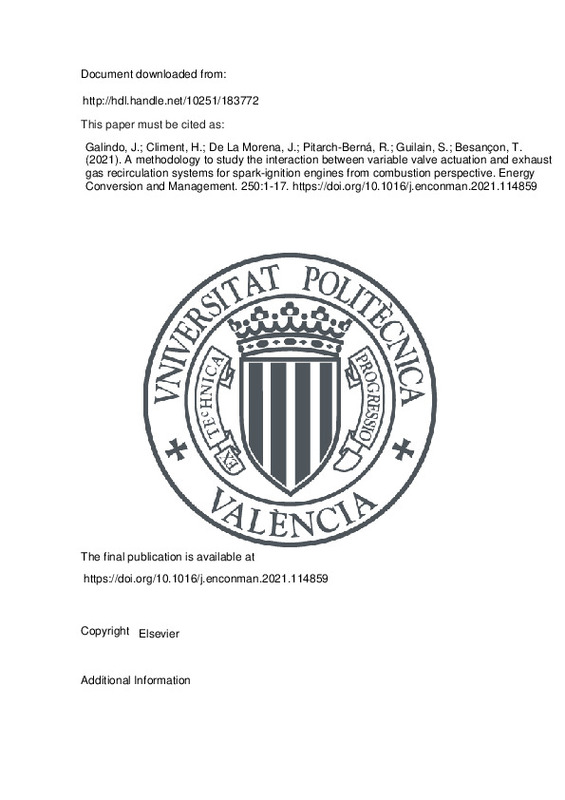JavaScript is disabled for your browser. Some features of this site may not work without it.
Buscar en RiuNet
Listar
Mi cuenta
Estadísticas
Ayuda RiuNet
Admin. UPV
A methodology to study the interaction between variable valve actuation and exhaust gas recirculation systems for spark-ignition engines from combustion perspective
Mostrar el registro sencillo del ítem
Ficheros en el ítem
| dc.contributor.author | Galindo, José
|
es_ES |
| dc.contributor.author | Climent, H.
|
es_ES |
| dc.contributor.author | De La Morena, Joaquín
|
es_ES |
| dc.contributor.author | Pitarch-Berná, Rafael
|
es_ES |
| dc.contributor.author | Guilain, Stephane
|
es_ES |
| dc.contributor.author | Besançon, Thomas
|
es_ES |
| dc.date.accessioned | 2022-07-01T18:04:03Z | |
| dc.date.available | 2022-07-01T18:04:03Z | |
| dc.date.issued | 2021-12-15 | es_ES |
| dc.identifier.issn | 0196-8904 | es_ES |
| dc.identifier.uri | http://hdl.handle.net/10251/183772 | |
| dc.description.abstract | [EN] Several technologies are being put in place to improve the efficiency of spark-ignition engines. Two of these technologies are variable valve actuation and exhaust gas recirculation, both of which can have an impact on combustion according to the literature. However, this impact is due to variations in both the in-cylinder tem-perature and composition, linked to the different characteristics of internal and external residuals, which are difficult to decouple. In this paper, a methodology aimed at improving the understanding of the temperature and composition effects on combustion parameters is developed. Internal residuals are controlled through a variable valve timing actuation, and evaluated thanks to a previously validated one-dimensional engine model, while the externally-circulated exhaust are extracted after the catalyst through a low-pressure system. Combustion is analyzed based on in-cylinder pressure acquisition and emissions measurement at the engine-out, before the aftertreatment module. Different combinations of internal and external residuals are tested with different stra-tegies from the point of view of the spark actuation: first, a constant spark timing for each value of total residuals; then, a spark timing adapted to maintain the same temperature inside the cylinder at the combustion start, and finally an optimized calibration from the point of view of the engine efficiency. Results show a general trend to enhance combustion timings as higher share of internal residuals are introduced for the same amount of total residuals. It can be seen how this trend comes mostly from the temperature effect at low total residuals fraction, while composition effects are more significant as the amount of total residuals increase. Empirical correlations developed in the paper confirm the need to decouple internal and external residuals to have a proper estimation of the combustion timings. Despite the positive impact of internal residuals on the combustion duration, a small fuel consumption benefit is reached with cooled exhaust gas recirculation thanks to lower heat transfer losses. In terms of emissions, unburned hydrocarbon emissions tend to be reduced with increasing the share of internal residuals thanks to the higher combustion speed, while other gaseous emissions are mostly affected by the total residuals amount. Therefore, internal and external residuals could be combined to achieve the best trade-off between fuel consumption and hydrocarbon emissions. | es_ES |
| dc.description.sponsorship | This research is part of the project PID2020-114289RB-I00 funded by MCIN/ AEI /10.13039/501100011033. The authors would like to thank Mr. Vicente Esteve Ferrer for his collaboration during the experimental campaing and testing activities. | es_ES |
| dc.language | Inglés | es_ES |
| dc.publisher | Elsevier | es_ES |
| dc.relation.ispartof | Energy Conversion and Management | es_ES |
| dc.rights | Reconocimiento - No comercial - Sin obra derivada (by-nc-nd) | es_ES |
| dc.subject | Spark-ignition | es_ES |
| dc.subject | EGR | es_ES |
| dc.subject | Residuals | es_ES |
| dc.subject | Combustion | es_ES |
| dc.subject | Emissions | es_ES |
| dc.subject.classification | MAQUINAS Y MOTORES TERMICOS | es_ES |
| dc.title | A methodology to study the interaction between variable valve actuation and exhaust gas recirculation systems for spark-ignition engines from combustion perspective | es_ES |
| dc.type | Artículo | es_ES |
| dc.identifier.doi | 10.1016/j.enconman.2021.114859 | es_ES |
| dc.relation.projectID | info:eu-repo/grantAgreement/AEI/Plan Estatal de Investigación Científica y Técnica y de Innovación 2017-2020/PID2020-114289RB-I00/ES/INTEGRACION DE SISTEMAS DE POST-TRATAMIENTO DE GASES DE ESCAPE MULTIFUNCIONALES EN VEHICULOS DE PROPULSION HIBRIDA/ | es_ES |
| dc.rights.accessRights | Abierto | es_ES |
| dc.contributor.affiliation | Universitat Politècnica de València. Departamento de Máquinas y Motores Térmicos - Departament de Màquines i Motors Tèrmics | es_ES |
| dc.description.bibliographicCitation | Galindo, J.; Climent, H.; De La Morena, J.; Pitarch-Berná, R.; Guilain, S.; Besançon, T. (2021). A methodology to study the interaction between variable valve actuation and exhaust gas recirculation systems for spark-ignition engines from combustion perspective. Energy Conversion and Management. 250:1-17. https://doi.org/10.1016/j.enconman.2021.114859 | es_ES |
| dc.description.accrualMethod | S | es_ES |
| dc.relation.publisherversion | https://doi.org/10.1016/j.enconman.2021.114859 | es_ES |
| dc.description.upvformatpinicio | 1 | es_ES |
| dc.description.upvformatpfin | 17 | es_ES |
| dc.type.version | info:eu-repo/semantics/publishedVersion | es_ES |
| dc.description.volume | 250 | es_ES |
| dc.relation.pasarela | S\455054 | es_ES |
| dc.contributor.funder | AGENCIA ESTATAL DE INVESTIGACION | es_ES |







![[Cerrado]](/themes/UPV/images/candado.png)

